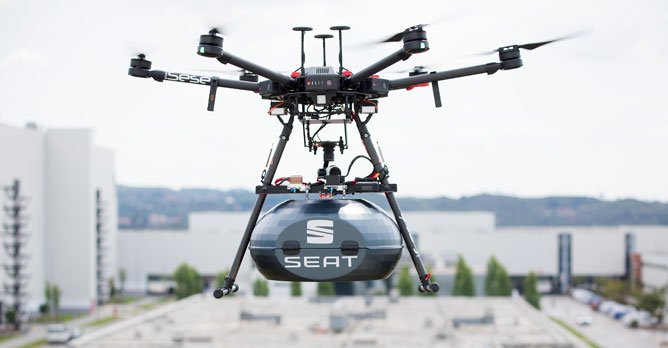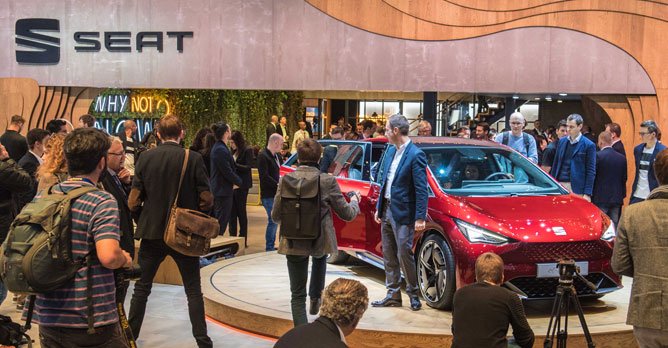Seat concludes an electrifying year
02 Jan 2020|1,328 views
In the past 12 months, Seat has improved on the record results from the previous year, began its electric offensive with the presentation of the new el-Born concept and the launch of the Seat Mii, and adds the presentation of the plug-in hybrid version of the Seat Tarraco, the brand's flagship model to the year's exciting progress.
The firm will add to this initial stage of electrification five more electrified models by early 2021.
Seat had already broken its own sales record in November with 542,800 cars, exceeding the volume for the whole of 2018 (517,600 cars sold) one month before the end of the year.
At the Mobile World Congress in Barcelona, the company took a major step forward in its urban micromobility strategy with the presentation of the Seat Minimo, a 100% electric concept car specially engineered to adapt to new mobility platforms aimed at becoming the great ally of cities.
While at the Geneva Motor Show, Seat presented its el-Born concept car, the first Seat conceived as an electric vehicle. With the el-Born, Seat will be the second brand in the Volkswagen Group to produce a model on the Modular Electric Drive Matrix platform in Germany. In addition, Seat has started marketing the Mii Electric, the company's first 100% electric model, and announced the introduction of the Tarraco PHEV, equipped with a plug-in hybrid engine and sporty FR trim.

This year the plant became the first Spanish factory to have a pioneering parts delivery service via drones. The pilot project supplies steering wheels and airbags to the assembly lines for the rapid supply of just in time parts, in just 15 minutes.
Furthermore, this year the company also implemented measures aimed at producing less waste and treating it more efficiently. Since 2010, Seat has improved its environmental production footprint by 34% with measures to emit less CO2, waste, and volatile compounds. It has also committed to use less water and energy, and has set a target to reduce its environmental impact by 50% by 2025.
In order to reduce the number of vehicles driving around the Martorell plant, Seat launched the Mobike and ByBus projects in 2019. Through collaboration with Mobike, the popular bike-sharing service, the Martorell plant provides 100 bicycles for employees to move freely around the plant in a sustainable way. In addition, the ByBus project, developed by the Seat Metropolis:Lab Barcelona team, offering the possibility of getting around the different points in Seat Martorell on demand.
In the past 12 months, Seat has improved on the record results from the previous year, began its electric offensive with the presentation of the new el-Born concept and the launch of the Seat Mii, and adds the presentation of the plug-in hybrid version of the Seat Tarraco, the brand's flagship model to the year's exciting progress.
The firm will add to this initial stage of electrification five more electrified models by early 2021.
Seat had already broken its own sales record in November with 542,800 cars, exceeding the volume for the whole of 2018 (517,600 cars sold) one month before the end of the year.
At the Mobile World Congress in Barcelona, the company took a major step forward in its urban micromobility strategy with the presentation of the Seat Minimo, a 100% electric concept car specially engineered to adapt to new mobility platforms aimed at becoming the great ally of cities.
While at the Geneva Motor Show, Seat presented its el-Born concept car, the first Seat conceived as an electric vehicle. With the el-Born, Seat will be the second brand in the Volkswagen Group to produce a model on the Modular Electric Drive Matrix platform in Germany. In addition, Seat has started marketing the Mii Electric, the company's first 100% electric model, and announced the introduction of the Tarraco PHEV, equipped with a plug-in hybrid engine and sporty FR trim.

The Seat factory in Martorell, in its commitment to creating a smart, digitalised and connected factory, has made significant advances to remain a benchmark for automation and data exchange.
This year the plant became the first Spanish factory to have a pioneering parts delivery service via drones. The pilot project supplies steering wheels and airbags to the assembly lines for the rapid supply of just in time parts, in just 15 minutes.
Furthermore, this year the company also implemented measures aimed at producing less waste and treating it more efficiently. Since 2010, Seat has improved its environmental production footprint by 34% with measures to emit less CO2, waste, and volatile compounds. It has also committed to use less water and energy, and has set a target to reduce its environmental impact by 50% by 2025.
In order to reduce the number of vehicles driving around the Martorell plant, Seat launched the Mobike and ByBus projects in 2019. Through collaboration with Mobike, the popular bike-sharing service, the Martorell plant provides 100 bicycles for employees to move freely around the plant in a sustainable way. In addition, the ByBus project, developed by the Seat Metropolis:Lab Barcelona team, offering the possibility of getting around the different points in Seat Martorell on demand.
Latest COE Prices
February 2026 | 1st BIDDING
NEXT TENDER: 20 Feb 2026
CAT A$106,320
CAT B$110,890
CAT C$74,801
CAT E$116,000
View Full Results Thank You For Your Subscription.






















